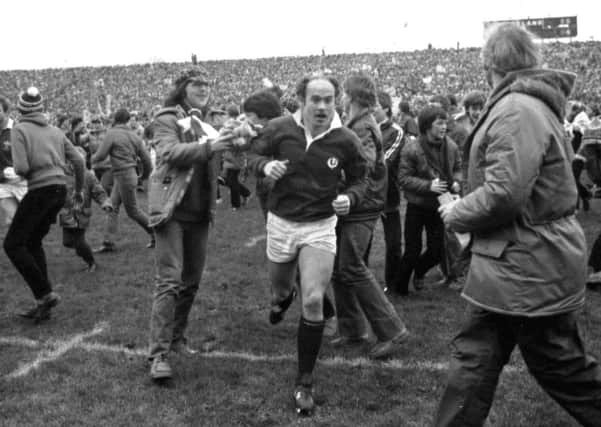Allan Massie: Scots can revive memories of Renwick and Co with win over Wales


Now Wales come to Murrayfield with a record of 12 wins in a row, and hot-foot from dismantling England in Cardiff a couple of hours after we succumbed in Paris. Moreover, the only time we have beaten Wales since Warren Gatland became their coach was two years ago when he took a pre-Lions tour sabbatical. So what can possibly go wrong for Wales? Some Scots may cling to the hope that the number 13 is unlucky.
Gatland’s team is generally very efficient –though they were dreadful for the first 40 minutes in Paris, throwing passes to nobody, knocking balls on, losing possession in the tackle and all at sea in defence. If at half-time on that Friday evening you had said that, come Round 4 of the tournament, only Wales would have a chance of a Grand Slam, kind friends might have asked you if you were feeling all right. Still, they are usually efficient and they were very efficient against England – wonderfully disciplined too, for they conceded only three penalties in the match. They may not be the most exciting or glamorous Welsh side one has ever seen, but they are very well drilled.
Advertisement
Hide AdAdvertisement
Hide AdIn contrast, Scotland were slow and inefficient in Paris. They never seemed to get into top gear, and often when the ball was at last released to Greig Laidlaw, he found there was nobody in a good position to pass to. Another scrum-half might have panicked and thrown out a wild pass, thus making things worse. On the other hand, another scrum half – Ali Price or George Horne – might have taken it on himself to break and speed things up.
Now Price gets his chance to show what he can do from the start and also put memories of a less than successful match in Cardiff last year to sleep. He certainly injected pace into what had been a lethargic Scottish game when he replaced Laidlaw in Paris around the hour mark. Considering our three competing (but also collaborating ) scrum-halves a couple of months ago I thought that if you rated them from 3 down to 1 in the various aspects of the No 9’s game, Laidlaw and young Horne might each have more 3s than Price, but he would have at least a 2, and no 1, in every category.
Still, as Laidlaw’s performance in Paris reminded us, a scrum-half depends on the quality of ball delivered to him. If it’s wretchedly slow he has few options: giving a short pass to a forward in the hope that this will lead to some momentum, or box-kicking. There was an awful lot of box-kicking, especially from England, at Cardiff, little of it successful. It was a match in which neither side seemed to want the ball, preferring to let the other side have it in the hope they would make a mistake.
For many, having little hope that anything good can come from the trip to Twickenham next week, today’s match represents the last chance to salvage something from a disappointing tournament. Apart from the re-introduction of Willem Nel, happily recovered from injury, Gregor Townsend has given the pack a chance to make amends for their collective failure in Paris. This is probably good psychology. In effect he’s saying, “you know you let yourselves down; now’s your chance to be what you know you can be.” No doubt Hamish Watson will come on at some point, probably before the hour mark, but other players returning from their medical time-out such as Sam Skinner and the Fagerson brothers are having to bide their time.
Many Scottish supporters seem a bit low after Paris, and of course an awful lot of them could have picked a better team than the one selected. It still looks a pretty good one to me. Some criticise the selection of Peter Horne and Nick Grigg in the centre. Neither might be Townsend’s first choice if others were fit and in form. But you have to select from those available, and these choices make sense. Peter Horne has played a lot outside Finn Russell and can read his game better than most; having him at 12 also gives you a left-footed kicker in midfield. Grigg is small for a centre in the modern game – about the size of Jim Renwick, I suppose, but he’s a gritty tackler and surprisingly fast and powerful runner.
If Wales are as good as their unbeaten run of 12 matches suggests, then they should win. But if they are no better than they have been in Paris and Rome this year, it shouldn’t be beyond Scotland to beat them – just as in Renwick’s day we beat the glorious Wales of Gareth & Co.